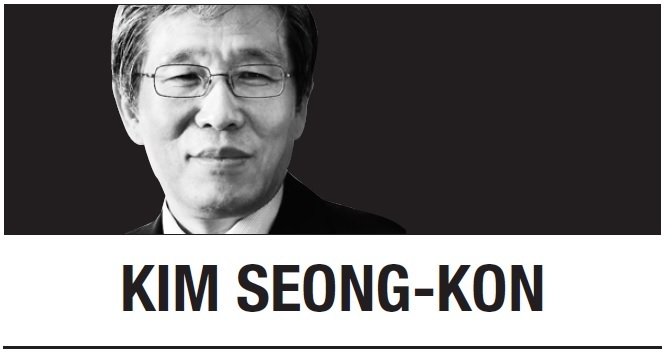
The above title is a riff and parody on Tennessee Williams’ famous play, “Suddenly Last Summer.” In this Southern Gothic play, Violet’s son, Sebastian, had died in Europe the previous summer under dubious circumstances. Since her niece, Catherine, knows the dark secret that led Sebastian to his death, Violet tries to erase Catherine’s memory by asking a doctor to perform a lobotomy on her to protect her son’s reputation.
Recently, I came across an intriguing Korean newspaper column entitled, “Suddenly I have become a pro-Japan collaborator.” I smiled at the title because I, too, wrote a similarly titled column some time ago, “Suddenly I have become a conservative.” Of course, we are neither pro-Japan collaborators nor conservatives. We just lament the absurd Korean phenomenon that extreme leftists wrongfully accuse someone who has a different opinion of being a conservative or a pro-Japan collaborator.
These days, we are aghast at the scandal evolving around a political activist’s alleged misappropriation of funds reserved for a civic organization founded for the former euphemistically labeled “comfort women.” When the above columnist supported and took the side of the former comfort women who had initially exposed the scandal, he suddenly found himself having to endure left-wing radicals criticizing him as a pro-Japan collaborator.
Suddenly this summer, some Koreans find that they have unwittingly become unpatriotic traitors simply because they have not participated in boycotting Japanese products.
Other Koreans, too, find that they have inadvertently become callously un-Korean simply because they are not supportive of North Korea or unification.
Suddenly this summer, many Koreans begin to wonder if they live in an Orwellian society because the social atmosphere forces them to join the one and only dominant ideology that does not allow diverse opinions.
In his recent interview with the Korean Ministry of Foreign Affairs on Korea’s success in fighting COVID-19, Dr. Michael J. Sandel at Harvard said, “My impression is that in South Korea, one of the reasons for the success compared to other countries is a greater sense of community and of social cohesion.”
It is true that our community spirit and social cohesion are merits that work beautifully when we fight a common threat. At the same time, we should be cautious: If pushed to the extreme, these same qualities can degenerate into serving the interests of a totalitarian regime.
Suddenly this summer, many Koreans have come to realize that Korea is a foremost advanced country, just like or even better than the United States or European nations. Due to their country’s relatively successful containment of COVID-19, Koreans are now quite elated. Watching some Americans hoard at the supermarket or loot stores during protest rallies for the late George Floyd, many Koreans click their tongues and say, “We didn’t know America was not so great. We’re much better.”
These days, we come across a plethora of Korean newspaper articles that carry that kind of mood, a sentiment of the utmost pride and superiority of the Korean people.
A recent newspaper column puts it rather pompously; “Now, we no longer need to fantasize about the US or Europe because we now know that they are no better than us.”
Another columnist writes, “We have overcome our inferiority complex at last. We did not know we had lived in an advanced country already.”
Of course, Korea’s endeavor to fight COVID-19 is laudable. Nevertheless, we should know that there is no such thing as an “overnight advanced country.” In order to become a truly advanced nation, we should meet a myriad of other qualifications than the success of quarantine.
Many Koreans perceive the current unrest in major American cities as nothing but chaos that the state or federal government cannot control. However, Dr. James A. Godley at Dartmouth argues this is not the case: “Some see the demonstrations and unrest over the death of Floyd as a sign of American weakness. But personally, I think the comparisons between the US and Hong Kong should be encouraged, because both movements are about protecting democracy and do not reflect weakness but the great strength of those who still believe in democratic values and the sense of decency that still exists among everyday people.”
Therefore, it will be too presumptuous and farfetched to assume that democratic, advanced countries are collapsing everywhere and Korea has now replaced them. Lately, a Korean college student named Kim Dae-hwan wrote to me, “Instead of childishly bragging about K-quarantine, K-bio, or K-culture, we should call for ‘K-men,’ that stands for ‘Know your place, men.’” Perhaps he was too modest, and yet insightful and perceptive.
Suddenly this summer, we find our politicians, like Violet in “Suddenly Last Summer,” planning to reinvestigate the past again, presumably to protect the reputation of their ideological precursors. However, we are already sick and tired of their fixation on the past.
Suddenly this summer, we realize we should be free from the stifling, totalitarian ideology that has chained us down for a long time and build an ideology-free, humane society of individual freedom instead.
Kim Seong-kon
Kim Seong-kon is a professor emeritus of English at Seoul National University and a visiting scholar at Dartmouth College. -- Ed.



![[Today’s K-pop] Blackpink’s Jennie, Lisa invited to Coachella as solo acts](http://res.heraldm.com/phpwas/restmb_idxmake.php?idx=644&simg=/content/image/2024/11/21/20241121050099_0.jpg)




